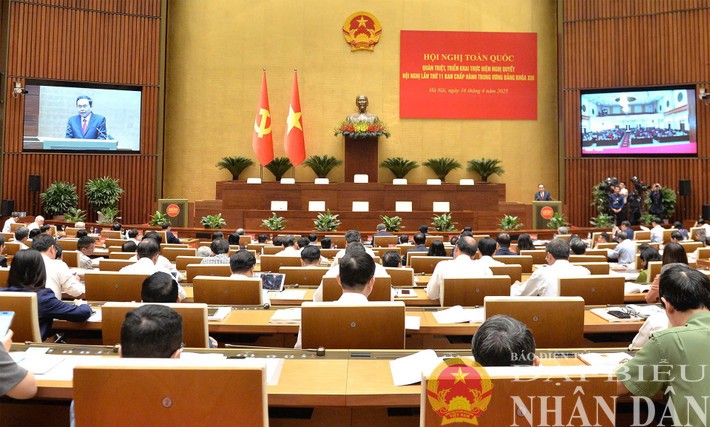(VOVWORLD) - Vietnam is streamlining its state apparatus and organizing a two-tier local government. In order to establish a legal foundation for the restructured system, amending the Constitution has become a top priority that must be done expeditiously.
 Legal foundation is laid for State apparatus reform (Photo: daibieunhandan.vn) Legal foundation is laid for State apparatus reform (Photo: daibieunhandan.vn) |
Since its inception in 1945, Vietnam has adopted five Constitutions – in 1946, 1959, 1980, 1992, and 2013. The current constitutional amendment, more than a decade after the previous amendment, requires a strategic vision that will ensure it aligns with the new context and provides a constitutional basis for restructuring the state apparatus and other reforms.
Constitutional revision - a priority at NA session
The 9th session of the 15th National Assembly will open on May 5, two weeks earlier than usual. High on the agenda will be amending the 2013 Constitution.
Speaking Wednesday at the National Conference to disseminate and implement the Resolution of the 11th Plenum of the 13th Party Central Committee, National Assembly Chairman Tran Thanh Man said that key reforms, including merging provincial-level administrative units, removing district-level governments, merging commune-level units, developing a two-tier local government, and restructuring socio-political and mass organizations under the Vietnam Fatherland Front, will open new directions for national development with a long-term vision.
Chairman Man said the Constitutional revision covers two agendas: "First, we will focus on provisions of the 2013 Constitution related to the Vietnam Fatherland Front and socio-political organizations to support the restructuring of the organizational system and enhance the role, responsibility, and initiative of the Vietnam Fatherland Front, especially in uniting people of all social strata and classes. Second, the amendment will also address provisions necessary for implementing two-tier local government."
Chairman Man also said constitutional amendments will affect 8 of the 120 articles in the 2013 Constitution. The National Assembly Standing Committee will submit the amendments in the form of a National Assembly Resolution. Emphasis will be placed on gathering public feedback during a one-month consultation period scheduled from May 6 to June 5, 2025.
Amending relevant laws
Implementing a two-tier local government model will require revisions to numerous laws and sub-law documents in addition to the constitutional amendments. According to a government report, more than 19,000 documents issued at the central or local level will be directly affected by reorganizing the political apparatus.
Accordingly, Vietnam will amend relevant provisions in the Law on Organization of Local Government, the Law on Election of National Assembly Deputies and People's Council Deputies, the Law on Organization of People's Courts, the Law on Organization of People's Procuracies, the Law on Cadres and Civil Servants, and the Law on Promulgation of Legal Documents. These laws are directly related to the organization of the state apparatus, and to the basic rights and interests of individuals, organizations, businesses, and local authorities, and they have a direct impact on socio-economic development, national defense, and security.
Chairman Man said: "At its 9th session, the National Assembly is expected to review and pass 31 draft laws and 12 resolutions, and opine on 10 additional draft laws, not including resolutions on the arrangement of province- and commune-level administrative units, which will also be considered during the session. This will be the largest legislative workload in the history of the National Assembly."
During the amendment process, special attention will be paid to promoting decentralization and delegation of authority—clearly dividing responsibilities between central and local governments, and between the province and commune level. The amendments will clarify which functions of district-level governments should be transferred to commune-level administrations and which should be assigned to the province-level government.
Amending the Constitution and related laws and resolutions must be completed before June 30 of this year, and take effect on the first day of July.
All work related to this major reform of the state apparatus is being carried out with urgency and determination. Amending the 2013 Constitution and completing the supporting legal framework in advance will create a solid legal foundation for this administrative revolution.